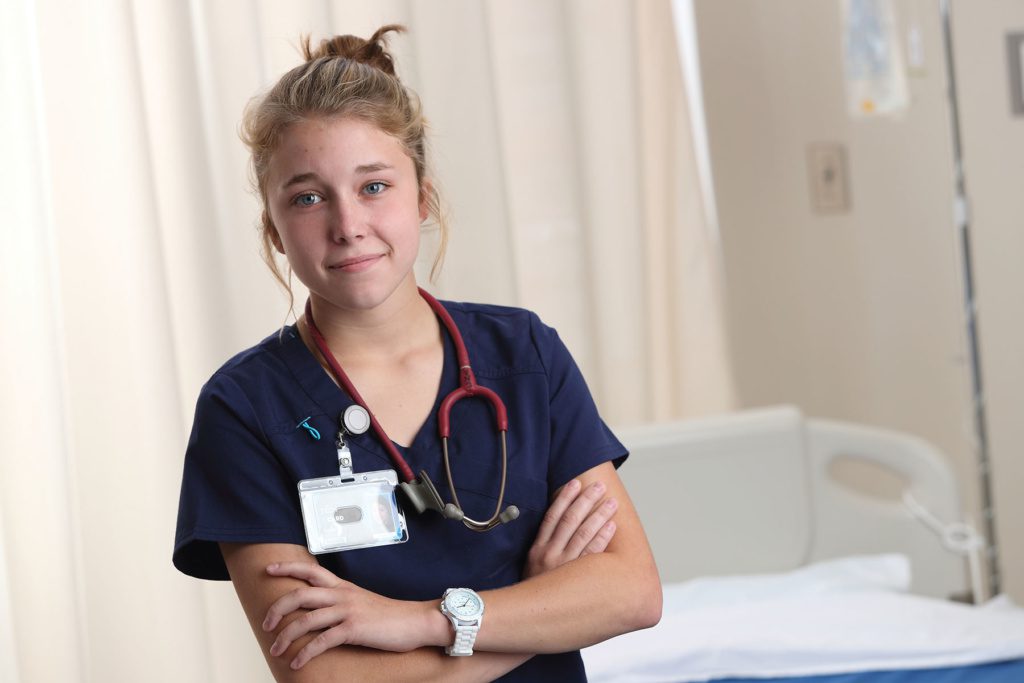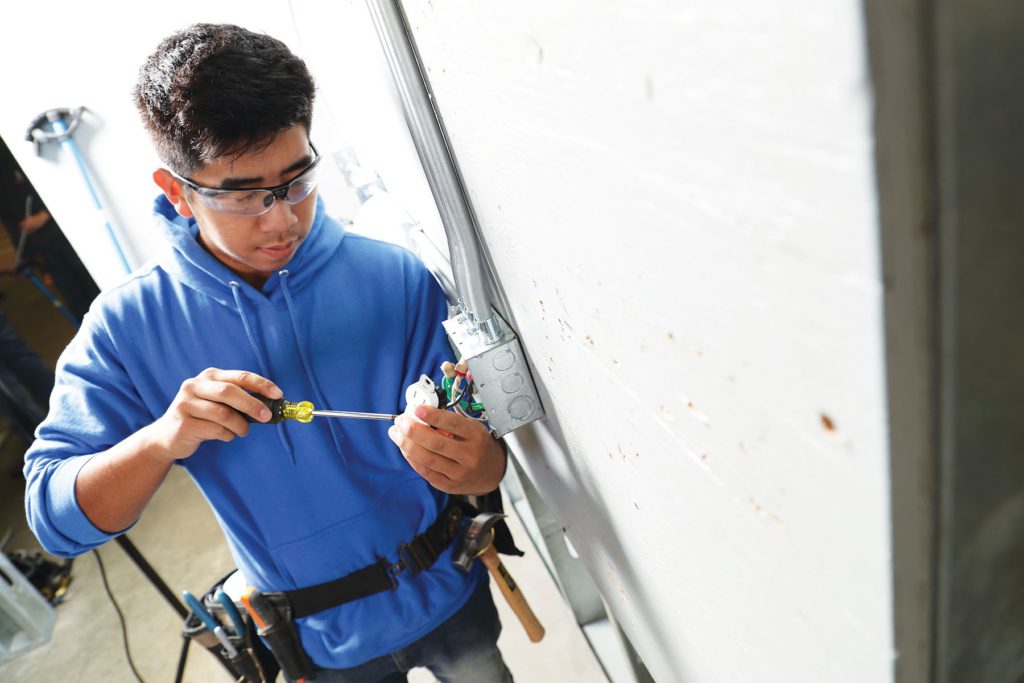Southeast Tech Building Programs to Meet Industry Needs
This paid piece is sponsored by the Sioux Falls Development Foundation. Source: siouxfalls.business
Fifty years ago, Southeast Tech began in Sioux Falls with six programs and fewer than 100 students.
A half-century later, it’s grown to 60 programs and more than 2,400 students.
“It’s up from last year again, so it’s nice to see that continued interest in trades and technical careers,” said Robert Griggs, who is beginning his third school year as Southeast Tech’s president.
Southeast Tech helps prepare students to secure jobs in the Sioux Falls area by tailoring its program offerings to match areas where workers are needed. That’s resulted in programs teaching skills in the following areas: Business, Transportation Technology, Horticulture, Industrial Technology, Media Communications, Healthcare, Engineering Technology, Law Enforcement, Early Childhood, Information Technology, Agriculture and Technical Studies.
“What’s really critical is that Southeast Tech respond to industry needs,” Griggs said. “In order to do that, we need to be in constant communication and conversation with industry representatives about what they see as current demand and what opportunities are going to exist for careers in the future.”
This school year brought a new program to train medical assistants, developed in response to needs from the healthcare field and with curriculum help from Avera Health and Sanford Health.
“They indicated they have a huge demand and need for medical assistants, and it’s a program we did not previously offer,” Griggs said. “It’s a one-year program that equips an individual to provide a variety of services.”
Southeast Tech is continually evolving and offering new opportunities for students to advance their career options – especially the estimated one-third of high school graduates in the Sioux Falls area who don’t seek post-secondary education.
Here’s a look at what’s coming next:
Dental Assisting
Southeast Tech will start a Dental Assisting diploma in the fall of 2020, allowing students to fast-track their way to a dental career.
It grew out of a dental apprenticeship program that began two years ago.
“And through conversations with the industry they have encouraged us to move it from an apprenticeship program to a one-year diploma program,” Griggs said. “A number of dental offices have contributed not only ideas but donated equipment and other resources to help us get the program launched.”
Working under the director of dentists and dental hygienists, dental assistants provide direct patient care, assist in dental procedures, perform dental radiography, offer patient education and perform office duties.
The curriculum is being developed to meet standards by the Commission on Dental Accreditation with help from the Southeastern District Dental Society, part of the South Dakota Dental Association, which includes 145 area dentists.
There will be space for 25 to 30 students per year.
“I think it will help meet the strong demand that area dentists are seeing,” Griggs said. “That’s being driven by population growth and the growth in our number of dental offices. We have seen a number of good relationships form already as our dentists have graduates from the apprenticeship program working in their offices today.”
Veterinary Programs
Two new programs in veterinary care will start in the fall of 2020.
A Veterinary Assistant one-year diploma will prepare workers to help evaluate and treat basic health, injuries and illnesses of large and small animals.
The Veterinary Technician two-degree degree prepares students to support veterinarians in evaluating and treating large and small animals by performing medical tests under a vet’s supervision and by providing assistance to biomedical researchers and other scientists.
The new programs help fill a void in the market created when Globe University closed.
“South Dakota has been without a Veterinary Technician program the last two years, so students that want to pursue that career are traveling out of state,” Griggs said.
“There have been a number of partners that have provided expertise in helping develop our curriculum and helped us with a facility and renovations.”
Partners have included Smithfield Foods and McCrossan Boys Ranch. The ranch will allow students to study large animal veterinary care on site.
“McCrossan Boys Ranch is thrilled to create a partnership with Southeast Tech,” executive director Brian Roegiers said. “We look forward to supplying the large animals to aid in the practical part of the program. We see this as a ‘win-win’ situation as both parties gain through this unique connection. Needed veterinary services are a plus for McCrossan while Southeast Tech has animals provided to help train young minds for the future of veterinary medicine.”
Southeast Tech “worked quite heavily with industry in terms of what they saw as the need, as well as with Globe University faculty that were part of the program and with veterinarians helping deliver the curriculum,” Griggs said.
While veterinary education programs traditionally are expensive to deliver, Southeast Tech is focused on keeping costs down for students. The programs will be able to accommodate 20 to 30 students each year.
“A capital campaign is focused on finding scholarship opportunities for students so that we can provide greater access,” Griggs said.
New Certificates
Southeast Tech offers semester-long certificate programs designed to give students skills that are immediately applicable in the workplace.
New this year are three construction-related certificates: General Construction, Residential Construction and Commercial Construction. They were developed in cooperation with the Associated General Contractors and the Home Builders Association of the Sioux Empire Inc.
“And all those are stackable, meaning they are part of a larger program,” Griggs said. “In our case, it’s a Construction Management program, so they can choose to continue on to a degree, but they can start out with a certificate to find out if that’s an area of interest for them. And that certificate provides enough basic knowledge and skills that they can get a job.”
Other certificates are offered in I.T. and welding.
Next up: A Telecommunications Tower Technician certificate program being proposed will be presented to the State Board of Technical Education in October.
It’s being developed with help from Vikor Teleconstruction in Sioux Falls and is designed to train wireless infrastructure technicians who will help with 5G expansion.
Talent Draft Day
Southeast Tech will be one of several schools participating in the first Talent Draft Day, organized by the Sioux Falls Development Foundation.
It’s a chance for students from Southeast Tech and other schools to rotate through three sessions of content and interact with businesses hiring for careers in advanced manufacturing, computer science, general construction, healthcare, informational technology and precision mechanics.
The free event will be held Oct. 17 from 8 a.m. to 6 p.m. at the Washington Pavilion. To learn more, click here. http://win.siouxfallsdevelopment.com/eventinfo/13
Participating businesses and talented students will:
- Network and connect to discuss part-time jobs, internships, job shadows and full-time careers;
- Participate in talent showcases, which allows each technical institute’s faculty and students to demonstrate a glimpse into the skills-based training that the students receive as part of their education;
- Attend a capstone presentation by Think3D Solutions;
- Engage in carnival-style game entertainment – with prizes! – while enjoying food and beverages.
“I think it’s a great opportunity for nontraditional students to find out about a lot of different careers that Southeast Tech can prepare them for,” Griggs said.
“When I talk with industry leaders, they tell me the biggest hurdle they have is finding the skilled workforce. In some cases, they’re turning down work because of it. This is a way for us to match talent with opportunities that exist in a wide variety of area businesses.”
September 19, 2019
Academics, Agriculture, Business, Healthcare, Horticulture, Human Services, Industry, Information Technology, Transportation Technology



